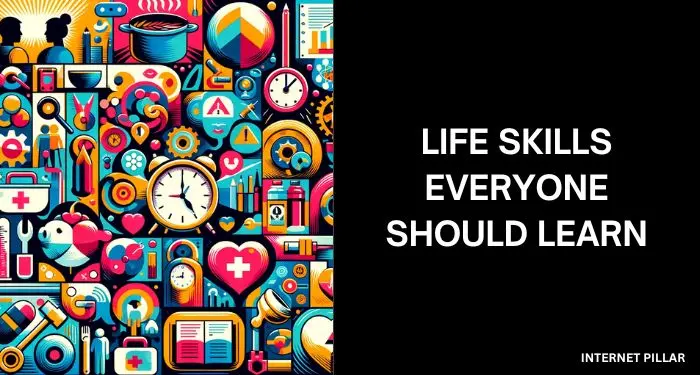Learning important life skills doesn’t stop after childhood or after you have completed your education.
Life can be tough and we often find ourselves unprepared for its challenges.
Beyond school-taught knowledge, there are everyday skills that can be lifesavers in unexpected situations.
From jumpstarting a car to saving a choking person – mastering various tasks can make a big difference.
The internet has a fun term for this: “Dadvice,” tips and tricks your dad might have shared.

There’s even an online community called Every Man Should Know, dedicated to sharing such useful skills, covering anything your dad might have missed.
Let’s get started.
35 Life Skills Everyone Should Learn
1. Essential Home-keeping Skills
Mastering home-keeping is important for everyone, from students to the elder people.
It is more than just tidiness; it is about health, organization and financial savings.
Start with a cleaning guide if you are new and consider a cleaning schedule or speed cleaning for upkeep.

2. Cooking Skills
Cooking isn’t just for chefs. Simple meals can be a lifesaver, providing nutrition and saving the day when takeout is not an option.
Even basic dishes like mac and cheese are valuable skills to have.
3. Using a Calendar
Using a calendar effectively is foundational to managing time well.
It helps organize daily tasks and events, making life smoother and more manageable.
4. DIY Home Repairs
Learning basic DIY repairs saves money and adds a sense of accomplishment.
Stores like Home Depot offer classes to get you started. Fixing a leak or re-caulking can be satisfying and economical.

5. Writing Skills
Good writing skills are essential, not just for authors but for everyone.
Basic sentence structure and expression can go a long way. Consider enhancing your skills through classes or online courses.
6. Effective Communication
Good communication is key in both written and spoken forms.
It’s about expressing yourself clearly and understanding others.
It’s essential for building relationships and navigating life successfully.
7. Public Speaking
Public speaking might be daunting for some but it’s a skill that improves with practice.
Learn to breathe, prepare and connect with your audience to enhance your speaking abilities.

8. Staying Safe in Daily Life
It’s essential to prioritize safety in various situations, whether it is avoiding driving after drinking or being cautious in unfamiliar areas.
Taking simple precautions like staying in touch with friends and being aware of your surroundings can boost personal safety.
9. Being Ready for Emergencies
Disasters can strike unexpectedly, so knowing how to respond is important.
Whether it is a natural disaster or a personal crisis, being prepared can bring peace of mind and keep you and your loved ones safe.
10. Navigating Without GPS
While digital maps are convenient, the ability to read traditional maps is a timeless skill.
It’s useful for understanding geography, navigating without cell service and teaching younger generations about spatial orientation.

11. First Aid Basics
Understanding basic first aid is invaluable, especially in emergencies involving injuries or health crises.
Learning these skills can help you stay calm and provide essential assistance when it’s most needed.
12. Car Maintenance Skills
Knowing basic car maintenance, like changing a flat tire, can save you time, money and hassle.
It’s also a step towards being more self-sufficient and confident in handling vehicle-related issues.
13. Budgeting for Financial Health
Creating and sticking to a budget is fundamental for financial stability.
It helps you track spending, save money and work towards financial goals, regardless of your financial literacy level.

14. Avoiding Debt
Living within your means and managing debt effectively are important financial skills.
Developing strategies to control spending and pay off debt can lead to financial freedom and reduce stress.
15. Financial Balance
Understanding the balance between saving and spending is key.
Keeping track of expenses and being mindful of your financial activities can impact your spending habits.
Try documenting your expenses for better financial awareness.
16. Organizing Financial Information
Organizing financial records is important for financial health.
It involves tracking expenses, understanding your budget and being aware of your financial standing, including debts and credit scores, to make informed decisions.
17. Smart Investing
Investing is a major step after managing debt.
It requires careful consideration, research and professional advice to ensure your investments align with your financial goals and risk tolerance.

18. The Art of Negotiation
Negotiation skills can lead to significant savings and benefits.
Whether it’s asking for a better deal on a purchase or negotiating a salary, being comfortable with negotiation can enhance your financial and professional life.
19. Time Management
Effective time management is essential for productivity and balance.
Using planners or digital tools to schedule tasks, set reminders and allocate leisure time can help maximize your day.
20. Healthy Eating
Choosing nutritious foods and managing portion sizes contribute to a healthier lifestyle.
Cooking healthy meals and making informed food choices are important life skills.

21. Taking Initiative
Being proactive and taking responsibility without being prompted is a sign of maturity.
Assisting others and taking the initiative in various situations can greatly contribute to personal and communal well-being.
22. Independent Thinking
Cultivating the ability to think and decide for yourself is important.
While it’s important to listen to wise counsel, ultimately, your life decisions are yours to make.
Strive for a balance between respecting advice and asserting your own choices.
23. Empathy in Decision-Making
When your decisions impact others, considering their perspectives is essential.
Thinking critically about the broader effects of your choices helps ensure decisions are considerate and inclusive.

24. Mental Agility
Keeping your mind sharp is akin to physical exercise for your body.
Engage in activities that challenge your intellect, such as reading widely, playing strategic games and writing.
Diverse reading and puzzles are excellent for brain health.
25. Finding a Mentor
A mentor can provide invaluable guidance in various aspects of life.
Identify someone whose path resonates with yours and seek their advice to navigate your goals more effectively.
26. Goal Setting
Developing clear academic and professional goals is a cornerstone of personal growth.
Setting both short-term and long-term objectives helps maintain focus and motivation towards achieving your aspirations.
27. Conflict Resolution
Learning to resolve conflicts constructively is key in all relationships.
Approach disagreements with calmness, empathy and a willingness to find common ground for mutual benefit.

28. Communication in Relationships
Effective communication in intimate relationships involves active listening, empathy and careful consideration of your words.
It’s about building connections, resolving conflicts and nurturing bonds with those closest to you.
29. Emotional Intelligence
Emotional intelligence is important for interpersonal relationships and understanding oneself.
It involves “being aware of” and managing your emotions and recognizing the emotions of others, which is important in both personal and professional settings.
30. Critical Thinking and Problem Solving
Critical thinking involves analyzing situations logically to make reasoned decisions.
Improving this skill can be achieved through brain-training activities and taking on challenges independently.
Practicing problem-solving without relying on others can also sharpen this ability.
31. Conducting Thorough Research
In an information-rich world, learning how to research effectively is key.
This means going beyond surface-level searches to understand various perspectives and ensuring information comes from credible sources.

Diversifying news sources can also provide a more rounded view of current events.
32. Maintaining Physical Fitness
Regular exercise is essential for physical health and mental well-being.
Finding a workout routine that fits your schedule and preferences can help in keeping you motivated and active, contributing to overall fitness.
33. Prioritizing Self-Care
Self-care encompasses physical, mental and emotional health.
It includes adequate sleep, personal hygiene and taking time for activities that promote well-being.
Remembering to care for oneself is as important as caring for others.
34. Clarifying Personal Values
Understanding and adhering to your personal values guides decision-making and behavior.
Knowing what’s important to you can help navigate life’s choices with integrity and purpose.
35. Learning Basic Sewing
Basic sewing skills, like mending a button or fixing a hem, are practical for everyday life.
They can save money and extend the lifespan of clothing, making them valuable skills to have.
So, these were some of the essential life skills everyone should learn.